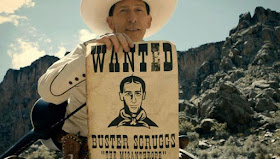SPOILER WARNING
Set in 1941 Los Angeles and chronicling the titular writer’s (John Turturro) discovery of the hell within Hollywood while staying at the Hotel Earle to now work for Capital Pictures, Barton Fink is perhaps the most expressive of the Coen Brothers’ filmography. Given that and the fact that it won three Cannes awards (including a unanimous Palme d’Or), it's surprising how it’s one of their lesser talked about films nowadays.
If anything, the film is an exploration of Fink’s mind and how he wraps himself around writing what’s expected to be a standard wrestling film, something he can’t bring himself to do, and the film doesn’t limit itself in that regard. It’s sprawling with symbolism and metaphors about his struggle, mainly through other characters and his interactions with them.
His point of view is captured spectacularly through Roger Deakins’ cinematography and the impeccable production design that demonstrates Fink’s mind; his process, his thoughts, and his difficult task to make sense of everything that happens to him.
And it doesn’t help that the people he’s working for are clearly not interested in making the film the way he is, so instead he gets help from the people he meets, including John Goodman’s Charlie Meadows, an insurance salesman who becomes Fink’s only friend in L.A. and also a motivation, as Goodman brilliantly portrays a friendly and talkative, yet mysterious man that helps him more than anyone else on the way.
This is especially true in how he discovers the effect of Hollywood in those he seeks out for help, with Bill Mayhew, who he considers to be the “finest novelist of our time,” who's now a disturbed drunk since coming to Hollywood, or producer of the wrestling picture Ben Geisler, who is abnormally desperate for him to write something that Capital Pictures head Jack Lipnick (Michael Lerner).
Lipnick is perhaps the biggest roadblock for Barton, as he claims that he holds more respect for the writer than anyone else. He almost holds a little too much respect for him in fact, and from the getgo he seems overly confident that he knows exactly what he’s going to get. This pressures him even more because, as previously mentioned, he wants to write something better that the common man can relate to.
And with Charlie’s inspiration, he is able to accomplish that with what he considers to be his best work yet. However, he is mocked for his achievement, being seen as a freak at a party where he tries to celebrate this accomplishment, and then the first readers of his script mock his efforts, leading into a spell-binding climax that leaves him realizing how much his work means to him, and what it says about everyone he hopes will encounter it.
Then, Barton encounters Lipnick for the final time, who is astoundingly disappointed, and now plans to leave him in the dust in favor of many other writers who are stuck in the same lie as him, and can get him that same “Barton Fink feeling” that he was expecting here. And as Turturro has portrayed Barton as a man slowly following the path being paved by himself with a little help along the way, he now shows him as lost; nowhere to go. He simply sits, with no understanding about what’s next and, as even seen before his last meeting with Lipnick, nothing else to seek out or go to. He’s just stuck at a dead end as a part of a picture of someone looking at nothing ahead.
Maybe he’ll be able to escape this hell and return to being able to tell “something beautiful, something about all of us.” But as far as we know, he's just another victim of the film industry.
This post is apart of Filmotomy's Cannes Film Festival retrospective. Please visit their website by clicking here to see other Cannes-related reads they have in store for it.



